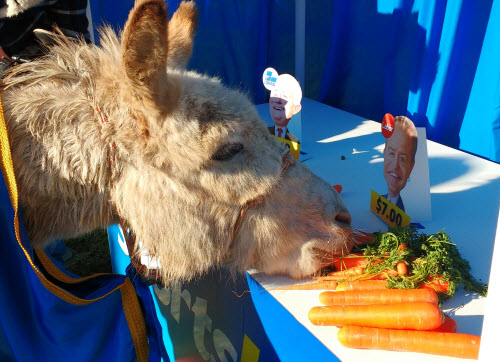The donkey vote factor could come into play this year, with academics writing that intentional informal voting is on the rise with the disaffected youth. This morning in Melbourne there was a different type of donkey vote. Given the choice between the Shorten pile of carrots and the Turnbull pile of carrots, Willow the donkey has voted for Bill Shorten to lead the country after July 2.

Even though Malcolm Turnbull is the punters’ favourite to win the election at $1.10 to Shorten’s $7, Willow had other ideas, choosing the Labor leader. In true form of donkey votes, Willow seemed disinterested in politics and quickly changed her mind when she saw a similar pile of carrots offered by Turnbull. Maybe she was just looking to see if there were Greens on the table. The stunt, set up by an online betting company, just makes us miss Paul the psychic octopus.







http://www.ntnews.com.au/news/northern-territory/burt-the-psychic-crocodile-picks-turnbull-coalition-to-win-federal-election/news-story/17d6edba6884f007e4d027b844ced2e4
As usual, the media confuses the labels ‘donkey’ and ‘informal’. Might we expect them to understand the difference? Here… I’ll help (sigh). The context–of course–is the Australian voting system:
Donkey vote – A ballot where a voter ranks candidates based on the order they appear on the ballot paper, either in forward or reverse order, although what might appear to be such a vote may also be a genuine representation of a voter’s intention. It can also be said that a voter who accepts a how-to-vote card and fills their ballot paper in by copying its suggested order simply because they don’t have a coherent voting intention is also a ‘donkey’. A donkey vote is valid.
Informal vote – The ballot paper has not been completed properly and the voter cannot count towards any candidate. A voter may go informal for various reasons (apathy, protest, confused by the complexity of the voting system, or ignorance of the rules). An informal vote is invalid.
The degree of informal voting is tracked and the data can be interpreted meaningfully by the political industry. An informal vote that is intentional (i.e. a protest vote) carries its own meaning. The informal vote is increasing, and–to the extent that there is a protest in that figure–the industry will ignore it at its peril.